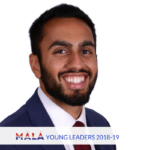Zain Jinnah is a member of the 2018-19 MALA Young Leaders Fellowship. Fellows participate in digital seminars, dinner discussions, and other MALA events. As part of the program, Fellows reflect on their multiple layers of identities – as daughters, sons, professionals, athletes, and so much more – and share those reflections into the MALA story collection. Personal stories can be a powerful catalyst for change – challenging stereotypes, building bridges, and inspiring action. In a country as diverse and complex as the United States, the identities of Muslim Americans remain layered and contested. We all have stories to tell: stories that deserve to be collected, conserved, and celebrated. We are honored to share the stories of our Fellows here.
My entire life, I’ve been a curious person.
I’ve always sought out difference and aimed to surround myself with it, in order to learn from the experiences and perspectives of others and broaden my worldview. On an intellectual level, that endeavor has served me well – it’s enabled me to explore the world when I couldn’t travel, and provided me with windows into different cultures, languages, and philosophies in a way that fueled my own growth.
On a personal level, however, the drive to always seek out difference has been a perpetual source of tumult. Being different has always meant I was out of place. In college, I spent much of my time around Muslims of different stripes, to develop my understanding of the various strands of Islamic theology I had not been exposed to. Having grown up in a relatively insular and decidedly liberal sect of Islam, I was incredibly excited to learn from some of my more doctrinal and theologically conservative friends, particularly given my deep interest in Islamic theology from a young age. But at every turn, when we would delve into text, or discuss social, historical, or theological issues, I found myself at odds with their approaches.
These clashes were tremendously helpful for my theological development, but I always felt on the outs – others would always brand me as the “liberal.” It was a label I could never escape – no matter how hard I tried to understand the others, to them, I was always defined by where I came from. It didn’t matter how far I was coming from my point of view toward theirs – it simply mattered how I was different.
This has been my experience at every turn throughout my life. While my Muslim friends always considered me liberal, my Caucasian friends regularly branded me as a “conservative” and defined me by my religious disposition. Similarly, my white colleagues would always consider me to be pretty “Eastern” in my cultural attitude, while my close friends – most of whom were immigrants – would call me “whitewashed” on the regular, for reasons such as the fact I spoke English with my family rather than my mother tongue.
For years, the feeling that I could never fit in was a source of internal discontent. No matter how hard I tried, others would not consider me one of theirs.
Over the years, however, I realized that this was scarcely a bad thing! I thrived on the different – on exposing myself to it, on learning from it, on growing from it. Why, then, did it matter if others saw me as different? Would that, in turn, allow them to engage with me, learn from me, and embrace aspects of who I am, just as I did for them?
In the time since that realization, I have come to embrace whatever makes me different from those around me. That typically means focusing on my Muslim faith and my Asian and African heritage, but at times it has several other facets. As a patriotic Canadian living in the U.S., and in the nation’s capital, it means identifying myself as such. As a lawyer in a city chock full of lawyers, it means making every effort possible to avoid being around lawyers, and, when I have to be around them, it means talking about anything but the law. And so on, and so forth.
What that means is that my identity is a relative one, rather than an absolute one. Of course, I still hold on to certain core tenets, but as human beings, and as Muslims, we’re social beings – we don’t exist in a vacuum, but in a broader community of people. As someone who loves interacting with that community, and learning from its incredible diversity, I am happy to have finally found a way to do so while remaining content with what makes me different as well.


